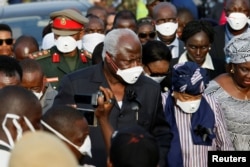The United Nations said Friday the death toll from mudslides in Sierra Leone's capital Freetown has surpassed 400.
Another 600 people remain unaccounted for as workers seek to recover more bodies from the thick mud and debris of smashed homes. Those efforts are hampered by rain, which remains in the forecast in coming days.
The International Red Cross Federation says while it is unlikely anyone will be found alive, the search for survivors continues.
"There is hope that some people are missing because, maybe, they were not around exactly in the place where it happens and their families are still looking for them and will be lucky to find them," IFRC Secretary-General Elhadj As Sy said. "Some may be stranded in remote areas that are not accessible right away, but we may find [them] alive."
The government began burying bodies Thursday.
Sierra Leone's President Ernest Bai Koroma offered his condolences and support during a burial ceremony.
"As we mourn, let me assure you that we all support the bereaved families and the injured. We will continue to stand by you and share with you your grief and help those of you that are traumatized and depressed, and in the process we all are committed that even with this difficulty Sierra Leone will rise again. May the God and the good Lord have mercy on the souls of our compatriots that have departed. May they be granted eternal rest. Thank you."
The government warned of a new danger from a large crack that has opened on a mountainside where residents were told to evacuate.
The mudslide occurred after hours of heavy rains early Monday, while many Freetown residents were still sleeping. Witnesses described a particularly hard-hit area in the Regent district, saying roads became "churning rivers of mud."
International assistance
Sierra Leone has asked for international assistance and said it’s doing all it can to stem the outbreak of deadly disease, while human rights organization Amnesty International issued a statement accusing the government of failing to learn from similar past incidents.
The U.N. is sending a team of seven experts to assess the damage and coordinate relief.
UNICEF called the scale of damage from the mudslides "unprecedented" and said its teams have been providing safe drinking water and sanitation to the large number of children affected by the disaster.
"Children have been left homeless, vulnerable and terrified. We must do all we can to protect them from disease and exploitation," said UNICEF Representative Hamid El-Bashir Ibrahim.
The Red Cross is launching an emergency appeal for more than $4.5 million to help 4,600 people over the next 10 months.
People affected by the mudslides and flooding are vulnerable to outbreaks of cholera and other water-borne diseases, warns a World Health Organization spokesman.
"Flooding has damaged or can damage or cause overflow to sanitation facilities increasing the risk of water-borne diseases," said WHO's Christian Lindemeier. "Flooding creates breeding grounds for mosquitoes and can cause — or most likely does cause — an increase in malaria and other vector-borne diseases."
VOA's Lisa Schlein contributed to this report from Geneva.







